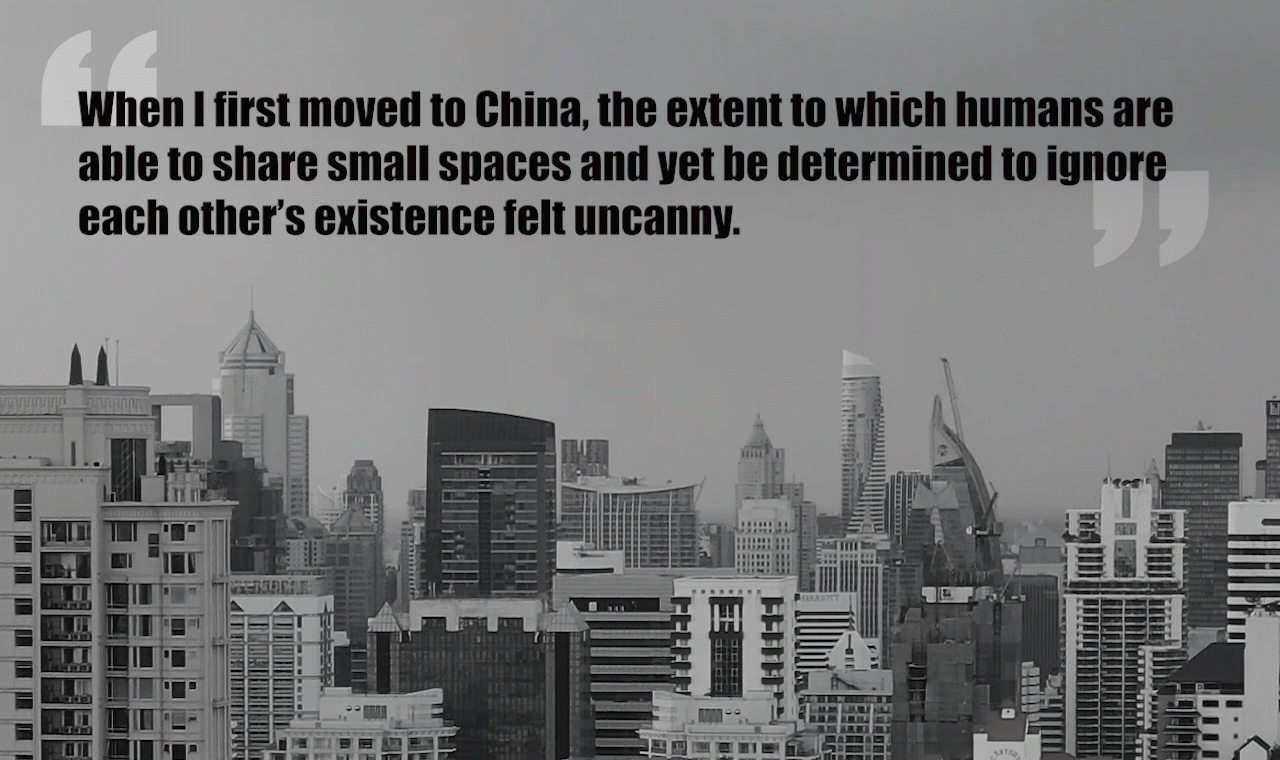My apartment sits on the corner of the twenty-first floor of a towering, squared building in the middle of Jing’An district. It’s big enough to be unpleasant to clean without the help of an ayi, and yet small enough to feel claustrophobic after half a day.
My building lacks the charm of lane houses in the former French Concession but also the comfort of a recently-built high rise. Quickly assembled at a time when China was rejecting its cobblestone past and yet not quite embracing its stainless-steel future, it belongs to none of the two golden eras of Shanghai, and it just sits there, 不冷不热. I would point out the lack of windows and balconies as the main shortcoming of this flat, but I can't be sure of the exact number. Out of the six bedrooms, I have only visited one — mine.
I am pretty sure no country has ever written into law that you have the right to know what your apartment looks like. Yet, at first, it felt odd to be completely unaware of the spatial features of the flat I live in.

I knew I would probably never see my flatmates’ rooms, so from the day I moved in, I started to silently gather information about them. What brand of toothpaste do they use? Do they bring friends back home? Do they wash their dishes immediately after eating, or do they leave them in the sink until the next day? My espionage operation proved to be largely unsuccessful. Almost six months later, I still don’t know which towel, spoon, and shoes belong to whom, I don’t know who eats so much ice cream and who is the one taking a shower past midnight every day. I don’t know their age or profession. To be honest, I don’t even know their names, as they use pseudonyms for both their WeChat profiles and kuaidis (with “Sin” and “Baby Boy” from room D and E being clearly outshone by the existentialism of “hahahahaha” from room B).
I might fall short of factual details about their lives and identities, but, strangely enough, I have never really felt the need to get to know them. I am curious, I love observing people, but it’s more a hobby than an actual thirst for connection. I am not disturbed by the lack of togetherness, certainly not troubled by silence. It feels, in fact, quite natural to be surrounded by complete strangers.
When I first moved to China, the extent to which humans are able to share small spaces and yet be determined to ignore each other’s existence here felt uncanny. Less than three years later, I have completely embraced it.

Rubbing elbows with people you don’t care about daily is not a choice, but an impending reality in Shanghai, one of the biggest and most densely populated cities in the world. If we had to pay attention to all those living in our building, we would have to remember a thousand different faces. If we had to bear in mind the names of all our former colleagues, friends of friends, shop owners, hookups, taxi drivers, baristas, baoans, and deliverymen, we would probably forget our own.
Many describe this indifference to others as alienation, and believe us urban dwellers are doom to drawn in our loneliness. I admit it, I would like to know all my flatmates’ age, profession, income and body count. Would that make me their friend? Not necessarily. Loneliness is not always a matter of how many people you interact with, but rather of the quality of those interactions. And this is why we ignore each other: the chances we would not like those around us are too high.
We shouldn’t think about urban spaces as dystopian emotional deserts. Not knowing my flatmates has given me a great deal of freedom: I don’t have to introduce them to the guys I bring home at night, or explain why sometimes I return home crying after a long day of work. But it also helps me tolerate them. Knowing nothing about them means I only perceive them through absences: the absence of noise late at night, the absence of trash around the apartment, the absence of hair in the shower. In most cases, it is only when we don’t understand other humans in their full-fledged imperfection that we can survive together.
I will not abandon my silent mission to gather information on my flatmates. But I will also refuse to be gaslighted into loneliness by narratives of intimacy that belong to the past (such as that we must connect to those physically around us to feel happy).
A more sensible option to survive the postmodern urban jungle seems to accept the reality of this overpopulated, hyper-technological country. After all, it is in this “loneliness” that many of us young urban dwellers are able to cultivate the most powerful intimate relationship of all: that with ourselves.





